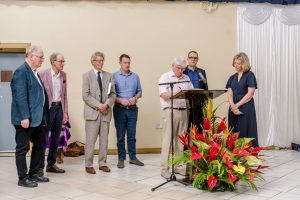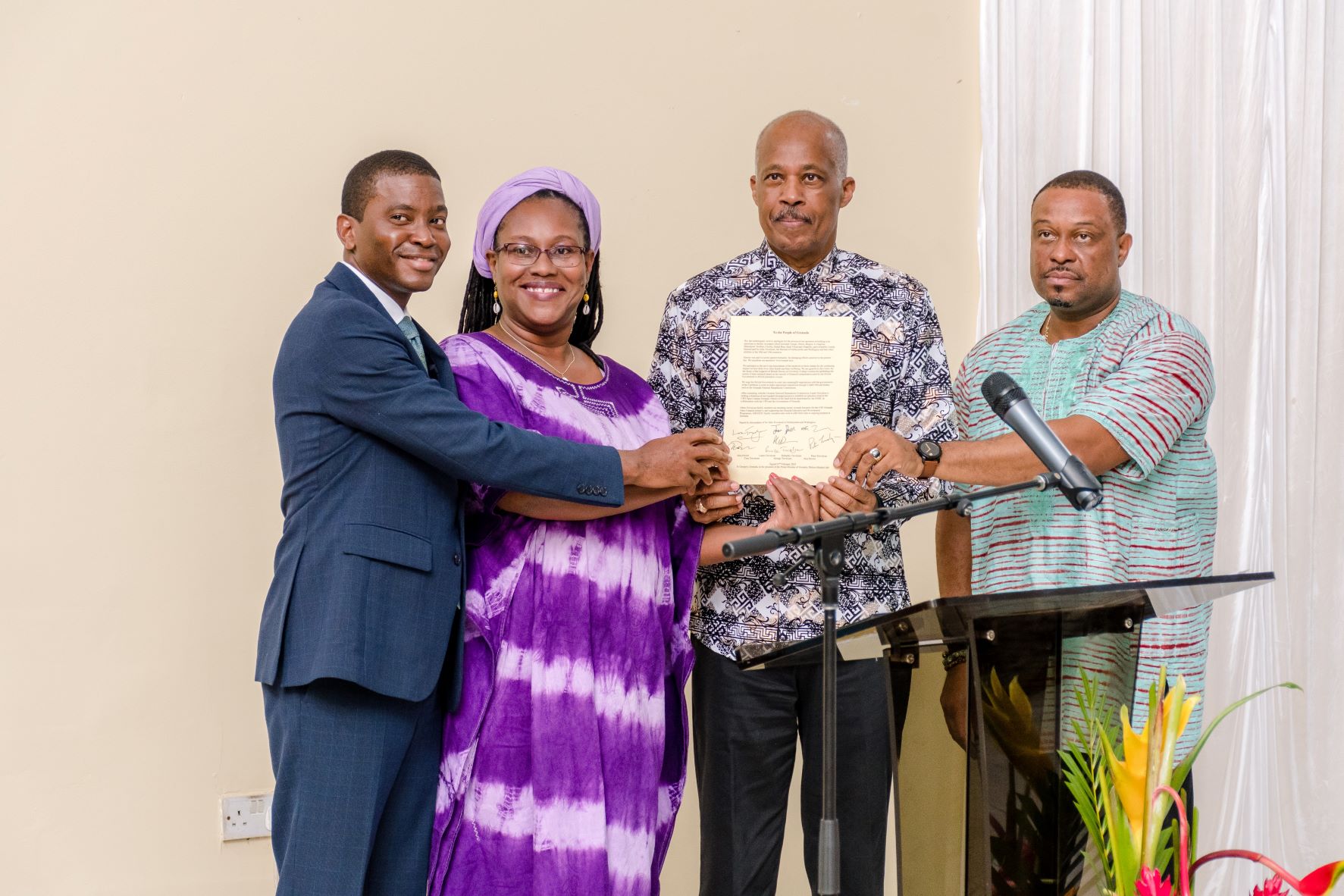(The UWI Regional Headquarters, Jamaica W.I. Press Release)—The first point in the Caribbean-led reparatory justice programme jointly championed by The University of the West Indies (The UWI) and CARICOM calls for ‘formal and sincere apology’ as a precondition of healing for descendants of enslaved peoples.
The Trevelyan Family apology on Monday, February 27, during a forum co-hosted by the Grenada National Reparations Committee (GNRC) and The UWI shows the successful application of this framework, which has come to be known as the “Ten Point Plan”.
Birthed from close consultations with Professor Sir Hilary Beckles in his dual lead roles as Vice-Chancellor of The UWI and Chairman of the CARICOM Reparations Commission (CRC), the Trevelyans delivered a public apology and an initial £100,000 to begin righting the wrongs of their ancestors who owned more than 1,000 slaves in the 19th Century.
Accompanied by a group of seven of her relatives, British-American BBC anchor/correspondent, Laura Trevelyan read an apology, signed by 104 of the descendants of the part owners of six plantations in Grenada. The Trevelyans in their collaborative statement acknowledged slavery as “a crime against humanity,” and noted, “its damaging effect continues to present day.”
“We repudiate our ancestors’ involvement in it, and urge the British government to enter into meaningful negotiations with the governments of the Caribbean in order to make appropriate reparations through CARICOM and bodies such as the Grenada National Reparations Committee,” said family spokespersons.

Sir Hilary who brokered and guided conversations with the Trevelyans and the Government of Grenada affirmed the transformative significance of the family’s initiative.
“These are developments that are transforming the world. These are developments that require courage and commitment to look into your history, your past and to recognize that a crime has been committed. A crime that has led to your own enrichment and privilege and to be able to say this was wrong. It was inhumane.”
“The reparations movement is a call for partnership,” Sir Hilary asserted.
“It’s a call for diminishing the debt owed to the people of this region. And it’s a call to have a shared vision for the future.” He clarified, “We’re not calling for racial strife. We’re not calling for international conflict. We believe reparations is the key for a win-win strategy for both sides of this conversation.”
As an activist institution, The UWI continues its championing of reparatory justice and the advocacy, consciousness-raising and support for the CARICOM Reparations Commission’s Ten Point Plan. The Trevelyans credited the Ten Point Plan as “the road map” guiding the Family’s journey to this juncture. Sir Hilary reinforced that the framework calls for “an apology, where there is an acknowledgement of a crime and a genuine and sincere desire to participate in an act of repair.”
Laura Trevelyan’s personal contribution of £100,000 will be used to establish an education fund for The UWI Open Campus, with details of the fund to be determined by the GNRC in collaboration with The UWI and the Government of Grenada. Other Trevelyan family members have also made commitments towards bursaries for The UWI Open Campus, Grenada, the Grenada Education and Development Programme, while others have offered their time to ongoing projects in Grenada.
With members of his cabinet in full attendance, Prime Minister the Honourable Dickon Mitchell accepted the Trevelyan apology on behalf of all CARICOM citizens as the beginning of a step in the right direction. “As a Head of Government,” he said, “I want to take the opportunity to join in a public request to my fellow Head of Government of the United Kingdom to accept our kind invitation to commence dialogue in an open, transparent, frank and dignified manner to talk of the need for reparative justice for the citizens of CARICOM.”
The Forum also included Arley Gill, Chair of the GNRC, and Dr Nicole Phillip-Dowe, GNRC’s Vice-Chair and Deputy Director (Ag.) of The UWI Open Campus Country Sites (OCCS), other government officials and CARICOM Reparations advocates, along with affiliates of the Rastafarian community and primary and secondary school students from across Grenada. It was held at the Annex, Grenada Trade Centre, and streamed live via The UWI’s public information platform UWItv.
Notes to the Editor: A copy of the recorded broadcast from the February 27 Grenada Reparations Forum can be accessed here.
About The University of the West Indies
The UWI has been and continues to be a pivotal force in every aspect of Caribbean development; residing at the centre of all efforts to improve the well-being of people across the region for the past 75 years.
From a university college of London in Jamaica with 33 medical students in 1948, The UWI is today an internationally respected, global university with near 50,000 students and five campuses: Mona in Jamaica, St. Augustine in Trinidad and Tobago, Cave Hill in Barbados, Five Islands in Antigua and Barbuda and its Open Campus, and global centres in partnership with universities in North America, Latin America, Asia, Africa and Europe.
The UWI offers over 800 certificate, diploma, undergraduate and postgraduate degree options in Culture, Creative and Performing Arts, Food and Agriculture, Engineering, Humanities and Education, Law, Medical Sciences, Science and Technology, Social Sciences, and Sport. As the Caribbean’s leading university, it possesses the largest pool of Caribbean intellect and expertise committed to confronting the critical issues of our region and wider world.
The UWI has been consistently ranked among the top universities globally by the most reputable ranking agency, Times Higher Education (THE). The UWI is the only Caribbean-based university to make the prestigious lists since its debut in the rankings in 2018. In addition to its leading position in the Caribbean in the World University Rankings, it is also in the top 25 for Latin America and the Caribbean and the top 100 global Golden Age universities (between 50 and 80 years old). The UWI is also featured among the leading universities on THE’s Impact Rankings for its response to the world’s biggest concerns, outlined in the 17 United Nations Sustainable Development Goals (SDGs), including Good Health and Wellbeing; Gender Equality and Climate Action. 2023 marks The UWI’s 75th anniversary. The Diamond jubilee milestone themed “UWI at 75. Rooted. Ready. Rising.” features initiatives purposely designed and aligned to reflect on the past, confront the present, and articulate plans for the future of the regional University.
Learn more at www.uwi.edu





